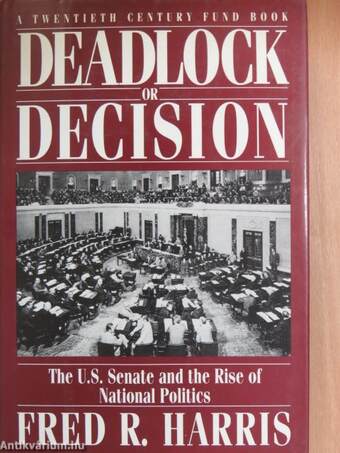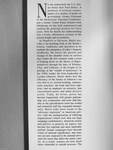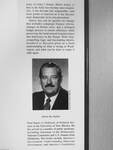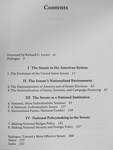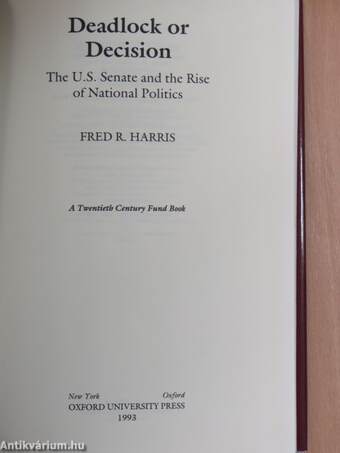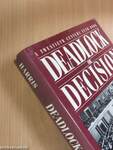1.116.661
kiadvánnyal nyújtjuk Magyarország legnagyobb antikvár könyv-kínálatát
Deadlock or Decision
The U.S. Senate and the Rise of National Politics
| Kiadó: | Oxford University Press |
|---|---|
| Kiadás helye: | Oxford |
| Kiadás éve: | |
| Kötés típusa: | Ragasztott kemény kötés |
| Oldalszám: | 344 oldal |
| Sorozatcím: | |
| Kötetszám: | |
| Nyelv: | Angol |
| Méret: | 24 cm x 15 cm |
| ISBN: | 0-19-508025-4 |
naponta értesítjük a beérkező friss
kiadványokról
naponta értesítjük a beérkező friss
kiadványokról
Fülszöveg
No one understands the U.S. Sen-ate better than Fred Harris. A professor of political science, author of a number of books on government, former Chairman of the Democratic National Committee, and a former United States Senator from Oklahoma, he has both experienced and studied the political process for forty years. Now he distills his understanding into a lively, informative account of the present Senate and its problems.
In Deadlock or Decision, Harris pro-vides a far-reaching look at the Senate's history, traditions, and operation as he explains the emergence of today's frequent deadlocks. He traces the growth and change of the chamber from its earliest days (when the first senators made a point of looking down on the House of Repre-sentatives) through the days of Webster, Clay, and Calhoun, to the height of its prestige as the "citadel of democracy" in the 1950s (under the firm leadership of Lyndon Johnson). Harris shows how the efficiency of the Senate in Johnson's era was... Tovább
Fülszöveg
No one understands the U.S. Sen-ate better than Fred Harris. A professor of political science, author of a number of books on government, former Chairman of the Democratic National Committee, and a former United States Senator from Oklahoma, he has both experienced and studied the political process for forty years. Now he distills his understanding into a lively, informative account of the present Senate and its problems.
In Deadlock or Decision, Harris pro-vides a far-reaching look at the Senate's history, traditions, and operation as he explains the emergence of today's frequent deadlocks. He traces the growth and change of the chamber from its earliest days (when the first senators made a point of looking down on the House of Repre-sentatives) through the days of Webster, Clay, and Calhoun, to the height of its prestige as the "citadel of democracy" in the 1950s (under the firm leadership of Lyndon Johnson). Harris shows how the efficiency of the Senate in Johnson's era was tied to its inward-looking, undemo-cratic practices: the body had firm traditions, and an emphasis on seniority, that concentrated power and aided decisive action. Today, he writes, power has become fragmented, with greater partisan-ship, less cooperation, and more individu-ality as the specialization norm has eroded and senatorial staff has expanded dramati-cally. Harris links these trends to the "advocacy explosion" in American poli-tics, with the multiplication of lobbying organizations (which now dish out huge campaign contributions). American society and politics in generál, he argues, has become less régiónál and more nationally unified; Senate campaigns have become events of national significance, and senators are now expected to be national advo-cates for issues that affect the entire coun-try. As a result, senators are now much more vulnerable to outside pressure. The
irony of today's Senate, Harris writes, is thai as the body has become more respon-sive, it has become less responsible—and more prone to inaction as it has become more democratic in its own procedures.
Harris lays out an agenda fór change that includes campaign fináncé reform, changes in Senate rules, and a reshaped budget process to restore efficiency while preserving the trend toward responsiveness and democracy in the Senate. With clear, compelling logic and fascinating details, Deadlock or Decision gives us a fresh understanding of what is wrong in Washington, and what can be done to make it right again.
About the Author
Fred Harris is Professor of Political Science at the University of New Mexico. He has served in a number of public positions, including chairman of the Democratic National Committee and U.S. Senator from Oklahoma. His books include America's Government, Understanding American Government, and America's Legislative Vissza
Témakörök
- Idegennyelv > Idegennyelvű könyvek > Angol > Művelődéstörténet
- Idegennyelv > Idegennyelvű könyvek > Angol > Történelem > USA története
- Művelődéstörténet > Eszmetörténet > Történelem > Politika
- Történelem > Idegennyelvű > Angol
- Történelem > Politika > Belpolitika > Egyéb
- Történelem > Kontinensek szerint > Amerika, amerikai országok története > Észak-Amerika
- Történelem > Politika > Pártok, szervezetek


